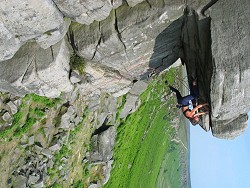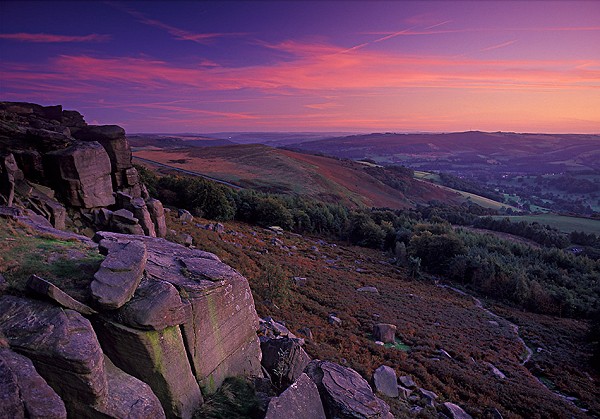
Stanage Edge, the popular climbing, walking and wildlife area on Sheffield's doorstep, could be leased or sold by the Peak District National Park Authority (PDNPA) to a 'like-minded' body.
In a news release coinciding with the bank holiday period the Authority has announced that it is currently consulting community groups and users about the possible transfer of Stanage and its surrounding North Lees estate near Hathersage, asking them what they would seek from any new partner.
It will then draw up its requirements for potential bidders to fulfill, covering conservation, public access, recreation, widening understanding of its wildlife and heritage and farming to high environmental standards. It would specifically exclude shooting rights.
Among the main bodies already consulted is the Stanage Forum, which represents local communities, climbers, walkers, birdwatchers and other interest groups. The Forum has advised on the management of the estate since 2000.
PDNPA Director of operations Richard Campen said:
'We want to find organisations or individuals who could continue to look after the special environment of Stanage and the North Lees estate and build on the good work we have already achieved. In the light of public spending cuts the Authority is in the process of transferring several of its assets to other like-minded bodies who have a commitment to conservation, recreation and widening understanding, but have more resources to invest than we do.'
'Stanage Edge is held in high regard for its spectacular views, world-class climbing and rare wildlife. We are determined that any new partner would protect those aspects and continue to involve user groups and local people in its management.'
Richard Campen is keen to allay any fears that a sell-off might endanger public access.
'Whether the land is leased or sold there will be legal constraints in place that will mean the estate is run according to a management plan agreed with the Stanage Forum that ensures the landscape must be conserved, public access must be retained as it is now and all other objectives are met. We would not lease or sell the land to anyone who only cared about profit. The whole point of this process is to find a partner who can invest money into the estate that we are not in a position to do.'
'For example, in February the nearby Eastern Moors estate was leased to a partnership of the National Trust and RSPB. As a result of that lease the estate will have extra money invested in it on top of that there would have been if we had carried on running the estate on our own. That benefits public access, enables more land to be conserved and wildlife to be protected. We are looking to achieve the same results at Stanage.'
The Authority expects to seek expressions of interest by the end of May or early June, with tenders invited towards the end of this year. A decision could be made by March 2012, and any transfer could be completed by March 2013.
In this age of public austerity the Stanage proposal is just the latest of several attempts by the National Park Authority to offload land onto third sector organisations. The Authority has recently:
- Leased its largest estate, the Eastern Moors, to a partnership of the National Trust and RSPB
- Sought partners for the Roaches estate in Staffordshire, with eight parties interested in its lease or sale. They must put in their bids by May 20 2011. Again conservation, access, recreation and local involvement are said to be given the highest priority, with shooting rights excluded.
- Agreed to sell its Losehill Hall environmental learning and conference centre at Castleton to the YHA, which will run it as a youth hostel and learning centre.

The British Mountaineering Council (BMC) has long expressed concern at the sell-offs.
'The BMC has been in discussion with the [PDNPA] on its asset disposal programme for the past 2-3 years' explains Chief Executive Dave Turnbull.
'Two of the Peak's most iconic crags - Stanage and the Roaches - are next on the transfer list and climbers and walkers can be assured that the BMC is doing everything it can to secure the best possible future for these sites. Our overall preference - for the PDNPA to keep hold of both - seems unlikely given the financial pressures on the Authority. The National Trust is interested in both Stanage and the Roaches. The Trust has significant experience owning and managing climbing and mountaineering areas across England and Wales (e.g. parts of Pembroke and Swanage, Brimham Rocks and much of the Lake District and Snowdonia) and in the BMC's view would be ideal choice for Stanage and the Roaches. The National Trust has a positive stance on access and recreation and unlike other landowners also has the power to declare land inalienable; this provides additional protection against future developments on land.'
'The BMC has met with several other parties with an interest in these sites and discussions are ongoing. Indications are that PDNPA is more likely to offer a long term lease for both sites rather than sell them outright. Whilst the BMC is not in a position to take on either crag ourselves we will certainly ensure that we are integrally involved with any new management structures introduced as part of a change in management.'
However as the recent Government climb-down on forestry makes clear, public opinion is strongly against the sale of publicly owned land. Critics of the sell-off or leasing of public land in the Peak fear for the long term future of estates such as the Roaches, pointing out that management of these areas has to balance the often conflicting needs of recreation, farming and conservation, something that few third sector organisations have the skills to do effectively. Revenue commitments are substantial, and income generation slim at best; it is unclear how many organisations have the budget to sustain the costs of long term management over decades. Opponents regard the policy as a frittering away of public assets, and worry that once they are gone the National Park's future ability to retrench the situation will be limited.
In a separate development, The National Park Authority has launched a public consultation to get the views of anyone with an interest in how the Peak District National Park develops over the next five years and beyond. The Join Our Conversation consultation asks for comments on a draft new National Park Management Plan, the main policy document that guides what will happen in the Peak between 2012 and 2017. This has been produced in consultation with a range of organisations, local businesses and community groups. The public consultation is intended to broaden the input further in the runup to a final plan being approved later this year.
Jim Dixon, chief executive of the PDNPA, said: 'Although a policy document might not sound important what it will deliver will have an impact on the lives of every resident, business and visitor. So it is really important that we check that the ideas of all the groups and individuals who have been involved in writing the plan match the hopes and needs of everyone with an interest in the National Park.'
'This is not our plan. It is a shared plan for all the organisations and people in the National Park, so we are also keen to get commitments from different people and organisations to deliver the actions proposed in it.'
The consultation document and an accompanying questionnaire can be seen online and at visitor centres at Bakewell, Castleton, Edale and the Upper Derwent. The closing date for comments is 1 July.













Comments